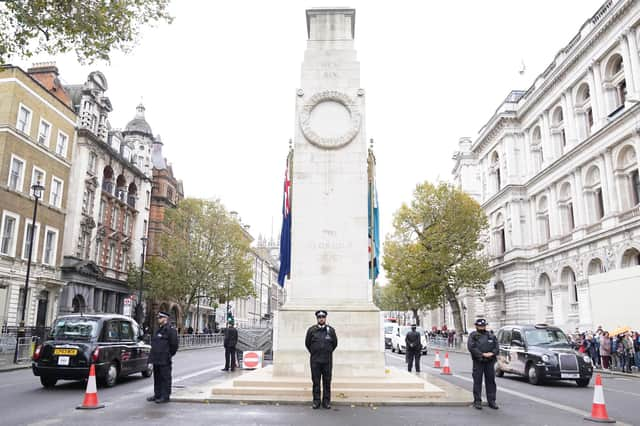Remembrance: Every life lost in every war is a tragedy for a family somewhere - Stephen Jardine


It’s Remembrance weekend, but this year it seems different. The Gaza conflict has spilled over into the annual events commemorating those who gave their lives for our country. With pro Palestinian protests planned across Britain, what happens this weekend is being portrayed as some kind of litmus test of where we are as a country.
Demonstrators say they are just exercising their right to peacefully protest with the route and timings designed to avoid a clash with commemorations. But the mood feels febrile.
Advertisement
Hide AdAdvertisement
Hide AdThis weekend feels like a big event but sometimes a little perspective goes a long way. In 1922, just two years after the Cenotaph was unveiled, unemployed veterans marched down Whitehall wearing pawn tickets on their lapels instead of medals. It was hugely controversial but other protests followed down the years. In the 1970s, the far right National Front held an annual Remembrance march down Whitehall, again there was outrage, as there was when war widows disrupted the two-minute silence.
There was uproar in the popular press over the jacket Labour leader Michael Foot wore to the Cenotaph and years later the papers said Jeremy Corbyn “looked like a tramp” because of his choice of attire. Then there are all the times a football player has refused to wear a poppy or the row when UEFA tried to stop players wearing one during a Scotland v England match in 2016, something then Prime Minister Theresa May branded “utterly outrageous”.
Almost every year Remembrance seems to be in the teeth of one storm or another. That is no bad thing, rather it is a measure of what it means to this country.
It wasn’t always like this. As time passed, down the years commemorative events had dwindled in significance, with Armistice Day merging with Remembrance Sunday. But as the centenary of the Great War approached and the last veterans slipped away, something stirred. School groups started to visit the Western Front, families began to delve into their history and a vast crowd turned out for the funeral of the last Tommy, Harry Patch.
No wonder. That Great War changed our country forever and we are still dealing with it’s consequences. It destroyed empires, turned the United States into a global power, emancipated women, decimated the ruling classes and led to the rise of communism in Russia and Hitler in Germany.
But it also left its mark on every community in Scotland. There are nearly 5,000 memorials commemorating the dead or missing, from Shetland to Stranraer, few towns or villages are without one. In tiny Kingholm Quay just outside Dumfries one mother lost three sons in the war, with a fourth taken prisoner. Recently a new street was named to commemorate their loss.
That story is repeated up and down the land, reflecting a scale of casualties that overwhelms anything we see nowadays. And that is why we remember and why the commemorative events will survive any passing rows or controversies.
Every life lost in every war is a tragedy for a family somewhere. Here we are lucky to be the first generations not called to serve our country. All we are asked is to respect and remember, and surely that is the least we can do.
Comments
Want to join the conversation? Please or to comment on this article.